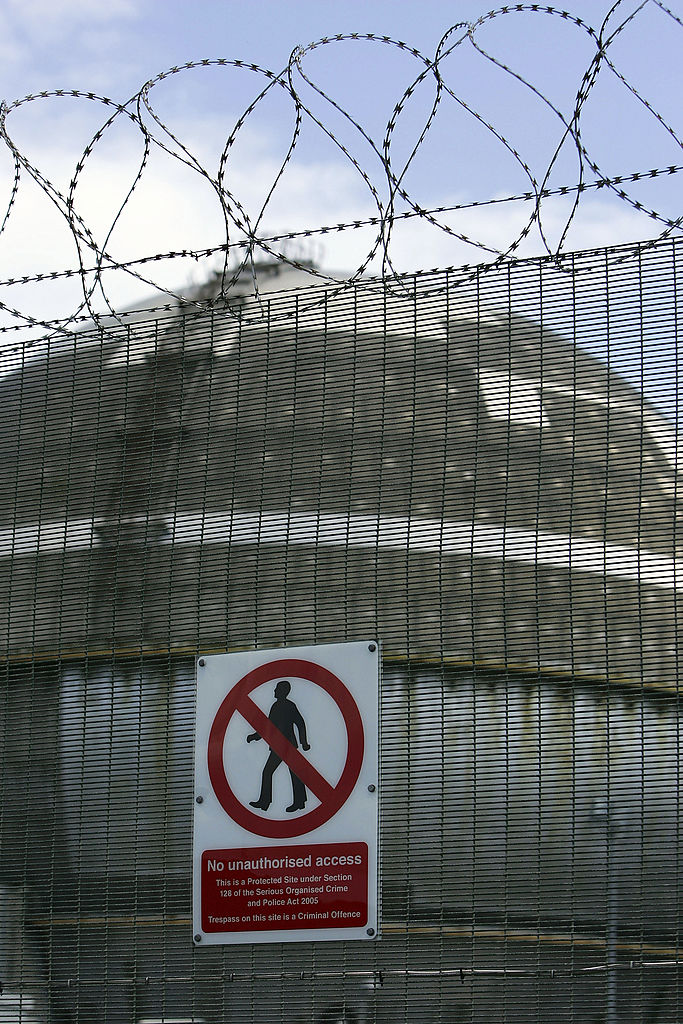Sellafield nuclear plant. (Getty)
A HR consultant who turned “whistleblower” to call out “vile homophobic abuse” at Europe’s largest nuclear site says she has been driven “close to the edge” by her ongoing legal battle.
Alison McDermott is a HR consultant who specialises in work on equality, diversity and inclusion (EDI). She began working with Sellafield and its governing body the Nuclear Decommissioning Authority (NDA) in 2016, under an 18-month contract via outsourcing company Capita.
She told PinkNews that she had received “glowing feedback” from Sellafield, and in 2018 she and her own company were commissioned on a further 18-month contract to investigate the culture at the nuclear plant – the largest and one of the most dangerous in Europe, storing more than 140 tonnes of plutonium.
During her time at Sellafield, McDermott says she discovered extensive “homophobic abuse, racism and sexism”, and “was asked to investigate the HR function because there were real problems”.
“I produced a report that said that the HR function was in crisis, and that the HR personnel had very little confidence to no confidence in the leadership team,” McDermott said.
“I also raised issues of vile homophobic abuse, which hadn’t been addressed, and racism and sexism.”

The next day, McDermott says, she was told that her services were no longer required because of “financial constraints”.
Later, according to McDermott, Freedom of Information requests would show that at the same time Sellafield had “embarked upon significant tendering exercises”, and a month after her dismissal had issued a £4.5 million contract for “HR transformation”.
The HR consultant says she was dismissed from Sellafield for calling out a culture of ‘abuse’
While working at Sellafield, HR consultant Alison McDermott spoke to many members of staff who had concerns about the culture at the nuclear plant.
In meeting notes taken by McDermott, seen by PinkNews, employees told her that there was an “infestation of sexual harassment”, that an openly LGBT+ person had been told by a colleague that “people would want to rape you”, and that when one worker came out as bisexual, they received “a significant amount of abuse”.
These reports were backed up by a 2017 site-wide equality, diversity and inclusion survey conducted by the NDA.
One in four respondents stated that both bullying and harassment and offensive comments were tolerated in the workplace and only a third of Sellafield workers surveyed said promotions were decided fairly, the survey reported.
But when McDermott reported her findings, she alleges she was told: “I hope you are not going to tell me that we now need to start letting women in who wear burqas.”
McDermott decided to take her case to an employment tribunal, to claim that she should have been protected as a whistleblower.
Shortly before the hearing, she says, she was offered a £160,000 settlement but would have had to sign a non-disclosure agreement. “My silence is not for sale,” she told PinkNews.
An employment tribunal revealed that ‘financial constraints’ did not lead to Alison McDermott’s contract termination
At her tribunal, McDermott alleged that while Sellafield claimed to have terminated her contract because of “financial constraints”, it was actually “direct retaliation and victimisation” after she spoke out about “allegations of wrongdoing and unlawful conduct to various members of the HR leadership team at Sellafield, three of whom… were directly implicated in the accusations raised by their own staff”.
Over the course of the 13-day tribunal, Sellafield’s lawyers changed the narrative surrounding McDermott’s termination, insisting it had happened because her report into the plant’s HR function was “questionable and insubstantial” and was therefore bad value for money.

Employment judge Philip Lancaster concluded that Sellafield had only mentioned “financial constraints” to allow McDermott to leave “with her head held high”.
Lancaster ruled that McDermott was not a whistleblower and that her contract was “was not terminated because of the subject matter in any alleged disclosure by the claimant”, but rather because of the quality of her work.
McDermott does not accept this decision, and told PinkNews that she believes these “concerns [about her work] were not genuinely held” by Sellafield.
The judge dismissed the case and said that it was “not about whether there was a so-called ‘toxic culture’ at Sellafield”. He added that there was no “link between what [McDermott] actually said or wrote and the only proven detriment to which she has in reality been subjected, which is the lawful termination of the contract”.
McDermott described “breaking down” on the witness stand at the tribunal, and said that the entire ordeal has been “absolutely devastating”.
Alison McDermott is pressing on with an appeal
Despite the events of the last three years, Alison McDermott says she refuses to back down and is waiting to see if she will be allowed to appeal the decision. However, she said the process so far has come at no small cost to her, both financially and personally.
McDermott says she will appeal the decision by the employment tribunal, not only because she was “so appalled at the way people were being treated”, but because she fears that this kind of instability as a nuclear plant could end in disaster.
In her tribunal witness statement, she asked: “If Sellafield and the NDA cannot get a grip on bullying and harassment and employees are too scared to speak out how can the public possibly have any confidence in their management of profoundly hazardous materials?”
“I spent £100,000 on legal fees, because I feel so strongly about this,” she told PinkNews.
“But I’ve now reached my financial limits.”
She managed to raise £27,000 through crowdfunding, and says she will have to do the same again to fund her appeal.
Through requesting her data from Sellafield via a Direct Subject Access Request (DSAR), she discovered an email, seen by PinkNews, which showed that the Nuclear Decommissioning Authority (NDA) had discussed trying to shut down her crowdfunding page for the initial tribunal.
“I had no income, because they’d taken my contract,” McDermott said. “I had no source of funding, it was my only source of funding, and they had all of their fees paid for by the public purse?”
McDermott said the experience has “devastated” her, and added: “It’s had a massive impact on my finances. It’s affected my family life. It’s affected my health. I’ve been under the care of a psychiatrist.”
Now, McDermott said, “they’re coming after me for costs [of the tribunal]”.
After waiting six months for a costs judgement, on 25 February she was ordered to pay £40,000 to Sellafield, the Nuclear Decommissioning Authority, and Sellafield’s HR director.
Lancaster wrote in his decision: “In all the circumstances of this case, especially given the extent to which the respondent, a publicly-funded body, has been exposed to the expense of defending an unmeritorious claim we do exercise our discretion to make an award.”
He also noted that there was “strong suspicion that in bringing this claim also against the [Nuclear Decommissioning Authority] the claimant is pursuing some ulterior motive related to her desire to position herself as the champion of equality within the nuclear industry and to court publicity accordingly”.
McDermott described the tribunal’s decision as “extraordinary and deeply unfair”, adding: “The smear is baseless; there is no evidence to support this accusation.
“This accusation was never pleaded nor was it put to me any point throughout the litigation or the hearing. It is a new allegation so I don’t even have the right of reply.
“Furthermore, the accusation is not even rational; it is common knowledge that blowing the whistle does not advance a person’s career – it decimates a career, which is exactly what has happened to me.”
She added: “It is impossible for me to restart my career, assuming my health ever recovers, when I am facing such insinuations from a judge, which will forever be part of a public record.
“I could gracefully accept losing at the employment tribunal if I felt that the judgment rendered was based on the merits of the case and on a fair appraisal of the factual matrix and evidence. However, on the contrary, I believe that the judgment represents a profound miscarriage of justice.
“The situation, already ongoing for over three years with many more months, if not years to come, has driven me close to the edge.”
As well as appealing the employment tribunal decision, McDermott is now also appealing the costs judgement, and is trying to to raise money for her case through crowdfunding. Donations can be made here.
An NDA spokesperson told PinkNews: “The Tribunal dismissed all of Ms McDermott’s claims entirely. Ms McDermott chose to make claims against three separate respondents, which stretched over a number of years and required more than three weeks’ worth of attendance at employment tribunal hearings.
“The NDA made an application for a summary assessment of our costs and have since been informed that we were successful in that application.”
A Sellafield Ltd spokesperson said the plant was “committed to eradicating bullying and harassment”.
The continued: “We do not tolerate this behaviour and where we find it, we address it.
“Because we are funded entirely by the UK taxpayer, we have an obligation to defend ourselves against legal action that could incur large sums in compensation, particularly when claims made against us are without foundation as in this case.
“This was a complex case stretching over a number of years which required more than three weeks’ worth of attendance at employment tribunal hearings, for which we were entitled to legal representation.
“As with all of our financial decisions, value for money for UK taxpayers was our highest priority. In light of the findings of the tribunal, which dismissed all of the claims made against us, we judged it prudent to apply for a proportion of our costs to be recovered.”
